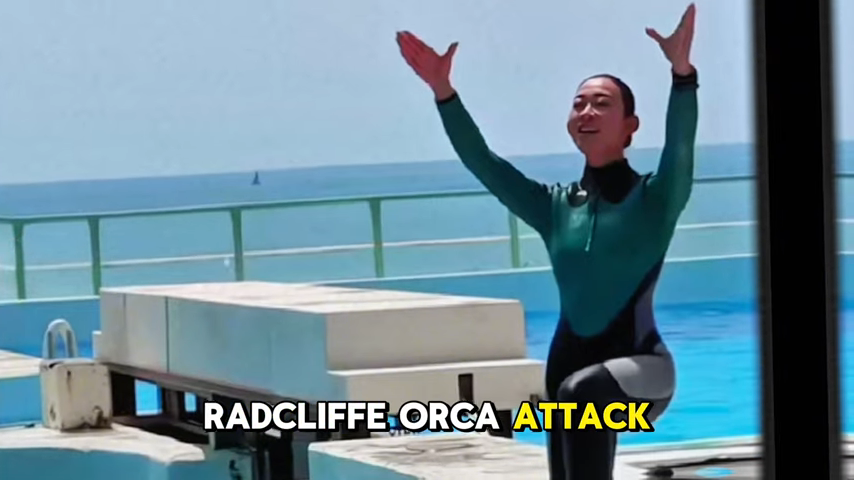In the age of viral videos and social media buzz, few stories spread faster than one involving a dolphin attack. Recently, a video claiming to show a marine trainer named Jessica Radcliffe being attacked by a dolphin has taken the internet by storm. But is it real? Or is this just another viral hoax?
The Viral Hoax that Took Over Social Media
The video, which allegedly shows Jessica Radcliffe being attacked by a dolphin, quickly went viral across platforms like TikTok, Facebook, and YouTube. With dramatic footage and a shocking narrative, it captivated many viewers. For a moment, it seemed like a tragedy unfolding before our eyes.
But here’s the twist: after some investigation, it became clear that the entire story was fabricated. The name “Jessica Radcliffe” doesn’t correspond to any real marine trainer, and no such incident involving a dolphin attack occurred.
How Misinformation Can Spread Like Wildfire
Once something grabs attention on social media, it spreads like wildfire. In this case, the video was edited, slowed down, and mixed with dramatic captions to create the illusion of reality. The use of AI-generated visuals only made it harder for viewers to spot the fakery.
It’s not the first time that something like this has happened. In fact, viral hoaxes like this one have become all too common. They often build on real-life events, such as the tragic 2010 death of SeaWorld trainer Dawn Brancheau, whose death by orca attack sparked widespread debates about animal captivity. These real events make the hoax seem more believable, even when it’s entirely fabricated.
The Impact of the Jessica Dolphin Accident Hoax
Even though the video was a fake, the Jessica Dolphin Accident hoax stirred up real emotions. It raised valid questions about the safety of marine animals in captivity and the dangers trainers face every day. But it also led to confusion and anxiety among viewers, who weren’t sure whether to believe the story or not.
The incident shows just how powerful misinformation can be. What starts as an attention-grabbing story can quickly snowball, shaping opinions and distorting the truth.
Lessons Learned from the Hoax
This incident serves as a reminder of the dangers of consuming information without questioning it. The internet is a space full of both truth and fiction, and it’s easy to get swept up in sensationalized content.
So, what can we do? First, we need to learn how to spot fake news. Verify sources. Look for credible outlets that provide factual reporting. It’s easy to get caught up in a compelling narrative, but a little skepticism can go a long way.
The Real Issue: Ethics of Captivity

Although the Jessica Dolphin Accident hoax has been debunked, it does shine a light on the bigger issue: the ethics of keeping marine animals in captivity. Real incidents, such as the tragic deaths of trainers by orcas, have raised serious ethical questions about the treatment of these highly intelligent creatures.
Movies like Blackfish brought the issue into the spotlight, showing how captivity can impact the well-being of orcas and dolphins. While the Jessica hoax may have been fake, it brings back the important conversation about the future of marine life in entertainment.
The Role of Social Media in Spreading Misinformation
We can’t ignore the role social media plays in all this. While platforms like TikTok, YouTube, and Facebook connect people and help them share their stories, they also allow fake stories to spread faster than the truth. It’s crucial for users to be more mindful of the content they engage with.
As for platforms, they must take responsibility for the content being shared. Fact-checking and swift removals of harmful misinformation are necessary to combat the spread of fake news.
What Can We Do to Avoid Falling for Viral Hoaxes?
Here’s the takeaway: the Jessica Dolphin Accident hoax is a wake-up call for all of us. While viral videos can be entertaining, they often come with consequences. Before jumping on the bandwagon and sharing a shocking story, take a moment to verify it.
By questioning what we see and hear online, we can protect ourselves from falling for misinformation.
Fact vs. Fiction: The Truth Behind the Jessica Dolphin Accident
It turns out the Jessica Dolphin Accident story is entirely fictional. With no credible evidence or official reports backing up the claim, this viral video was just another attempt to manipulate emotions for clicks. It’s essential to approach viral content with skepticism and verify information from trusted sources.
For More Information:
- Hindustan Times: Fact Check on Jessica Radcliffe Orca Attack Hoax
- Ethics of Marine Animal Entertainment: National Geographic
By examining the Jessica Dolphin Accident hoax, we can learn how misinformation spreads and the importance of questioning what we see online. Through greater awareness and responsible digital behavior, we can make better-informed decisions and protect ourselves from falling for the next viral hoax.
